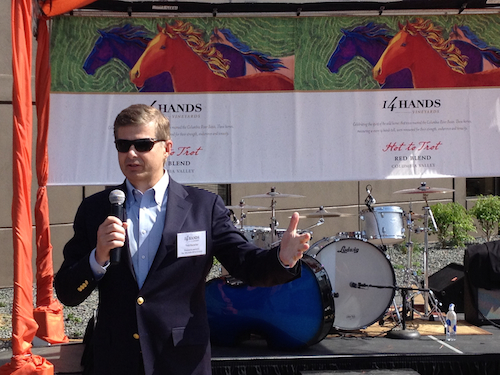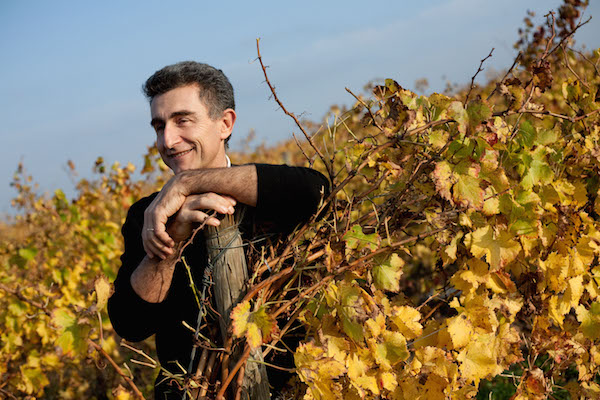
WOODINVILLE, Wash. – Washington’s wine industry is perfectly poised to not only continue to gain prominence in the world of wine, but also enjoy incredible growth.
So says the leader of Ste. Michelle Wine Estates, which uses two out of every three grapes grown in Washington.
“We see that there could potentially be 200,000 acres of premium vineyard land in Washington, given the future potential with water and appropriate vineyard sites,” said Ted Baseler, president and CEO of Ste. Michelle. “It’s going to be long term. I’m talking 20 to 25 years down the road.”
Washington has a little more than 50,000 acres of wine grapes planted. For the past 50 years, Ste. Michelle has fueled the state’s vineyard and winemaking growth.
For our 100th episode of the Great Northwest Winecast, we asked Baseler to come onto the program to talk about the state of the Washington wine industry and his company’s role in its future.
Here’s the interview:
Washington’s potential growth

A few years ago, Baseler talked about how Washington and other West Coast wine regions needed to step up their growth to keep up with the demand for domestic wines. In this interview, he said waning interest in sub-premium wines – low-end jug and box wines – have actually been a reason for some California vineyards to be removed.
“Sub-premium wines have been declining, and as a consequence, what we’re seeing is vineyards being pulled out in the Central Valley,” Baseler told Great Northwest Wine. “There are projections that over the next four years, there could be as many as 120,000 acres of vineyards pulled out of California. That would accelerate the need for supply, which frankly could be an enormous opportunity for Washington.”
One of the Washington brands that could help fill the need is 14 Hands in Prosser, which is owned by Ste. Michelle. The brand is just 11 years old but continues to be a phenomenon, surpassing 2 million cases of production per year. That makes it not only Washington’s second-largest winery (trailing Chateau Ste. Michelle, ahead of Columbia Crest), but also the eighth-largest premium wine brand in the United States.
And to think it all started out as a restaurant-only wine in 2005.
“I’d like to say we knew exactly what would happen and we forecast it perfectly, but that would be a slight exaggeration,” Baseler said with a grin. “The truth is sometimes you just hit upon an idea and it explodes. And that’s precisely what happened with 14 Hands. It has been a very magical wine that has a great story behind it.”
The winery is named after the wild mustangs that once roamed the Horse Heaven Hills south of the Yakima Valley. They were diminutive – only 14 hands tall – and would travel to the Columbia River to drink.
While 14 Hands primarily focuses on value wines in the $10 to $15 range, it also has a successful reserve program with $30 wines and recently introduced an ultrapremium red blend that retails for $60. Baseler said Washington competes quite well in those spaces.
“I would say in the last month or two, I’ve run into more friends from California talking about the success of Washington and the price-to-value relationship,” he said. “For $40 to $50, you can get a magnificent bottle of wine from Washington that competes with wines that are double and triple that price in California. I believe that’s why we’re seeing more and more quality California wine companies moving to the Pacific Northwest – and Washington in particular.”
In the past few years, such companies as Duckhorn and Cakebread – both high-end Napa Valley producers – have opened wineries in Washington. Rather than see these as a threat, Baseler views them as an opportunity.
“It’s a big tent, and they’re welcome in,” he said. “Quite frankly, we’re not all that hung up on market share. We’d rather have the pie grow much faster. Maybe someday, we have only one out of every three grapes in the state. That would be just fine, particularly if there were 10 times as many grapes. We just think that we can win together.”
Collaborations help drive Washington wine

For the past 20 years, Ste. Michelle has used international collaborations as part of its strategy – not only for the company’s growth but also to fuel interest in Washington wine.
“They’ve really been beneficial, particularly for Washington in a general sense,” Baseler said. “When you look at the fact that Antinori has been invested in Washington for 20 years now, that’s been remarkable.”
Antinori and Ste. Michelle co-own Col Solare, a Red Mountain luxury winery, since 1995. The connection that helped bring the two companies together was André Tchelistcheff, arguably the greatest winemaker in U.S. history. After retiring as head winemaker of Beaulieu Vineyards in Napa Valley, he was a consultant for both Ste. Michelle and Antinori.
“He urged Piero Antinori to come to Washington, where wonderful things were happening,” Baseler said.
Ste. Michelle also has projects with Ernst Loosen, one of Germany’s most famous winemakers, and Michel Gassier from the south of France.
“The Old World still has a certain panache and credibility that helps reinforce what’s happening in Washington,” Baseler said.
Tenet Wines, the project with Gassier and Philippe Cambie, has quickly paid off. The Tenet 2013 Pundit Syrah (a $25 Washington red) placed at No. 34 on Wine Spectator’s top 100 list last fall.
“We were delighted, needless to say,” Baseler said.
While he is pleased with the growth in quality and quantity in Washington wine, Baseler said he believes it’s now time to show the world just how good this region is. About a dozen years ago, the Washington State Wine Commission put on a series of blind tastings across the United States, putting up top Washington wines against great Napa Valley and Bordeaux reds.
Baseler wants to do it again.
“Probably the next thing we need to do to trigger a revolution is a blind tasting with the best areas of the world,” he said. “I’ve got some ideas on people we could use that would make it very legitimate and have the highest of credibility, which is essential for a blind tasting with a panel of judges.”
This year also happens to be the 40th anniversary of the famous Judgment of Paris tasting that propelled the California wine industry toward its current world prominence.
“Prior to that monumental, epic tasting that shocked the Parisian tasters, there was French wine and everybody else,” Baseler said. “And that really put Napa Valley – but also, I think, West Coast wines – on the map.”
Ste. Michelle and Antinori now co-own Stag’s Leap Wine Cellars, whose 1973 Cabernet Sauvignon finished first in the Judgment of Paris.
Last year was Baseler’s 30th with Ste. Michelle Wine Estates – and he’s been the CEO for half of that. There are no signs of him slowing down.
“I’ve got a great job that I love,” he said. “The passion of the people we have is incredible. They’re so dedicated, talented and creative. I also think that we have an opportunity to change history and really put Washington on the map. I think we’ve done that, but there’s another phase that has to be completed that people undeniably confess their love for Washington wines, and we’re moving in that direction.”
For Baseler, that means more jobs, more vineyards and more wine.
“The potential for expanded acreage here is sensational. Whatever part we can play in creating the next phase in the industry, we’re excited about it.”
[powerpress]

Leave a Reply